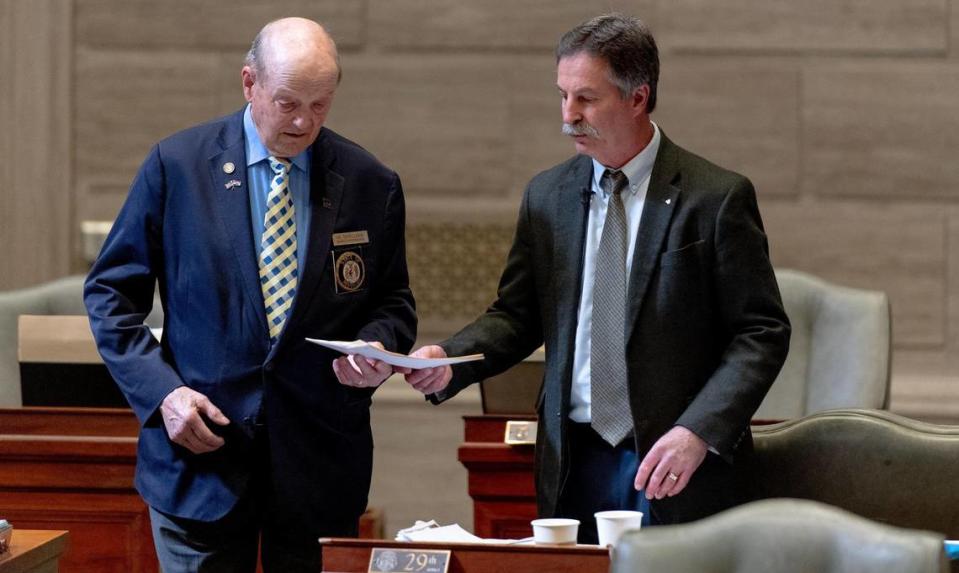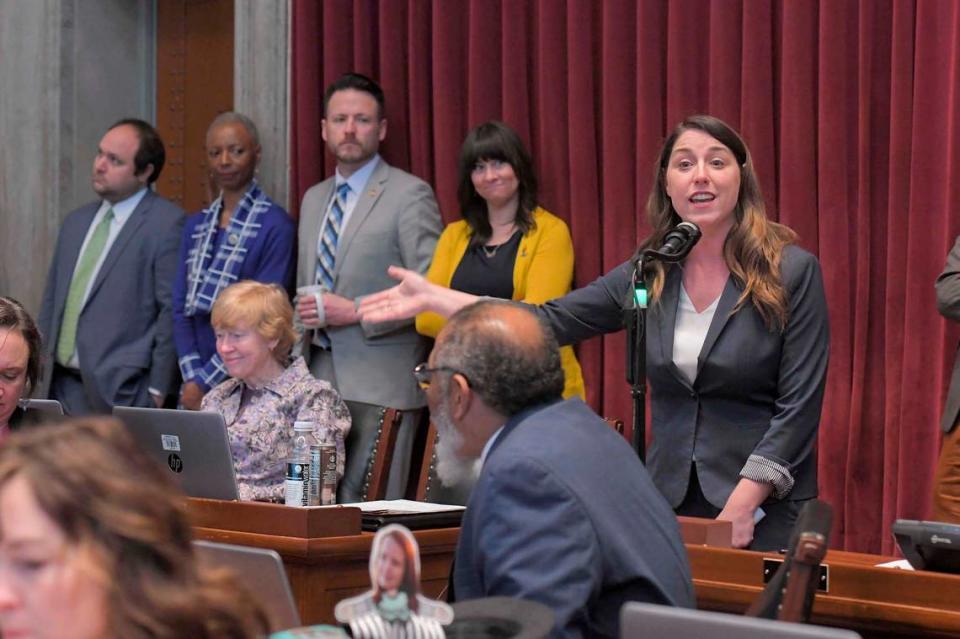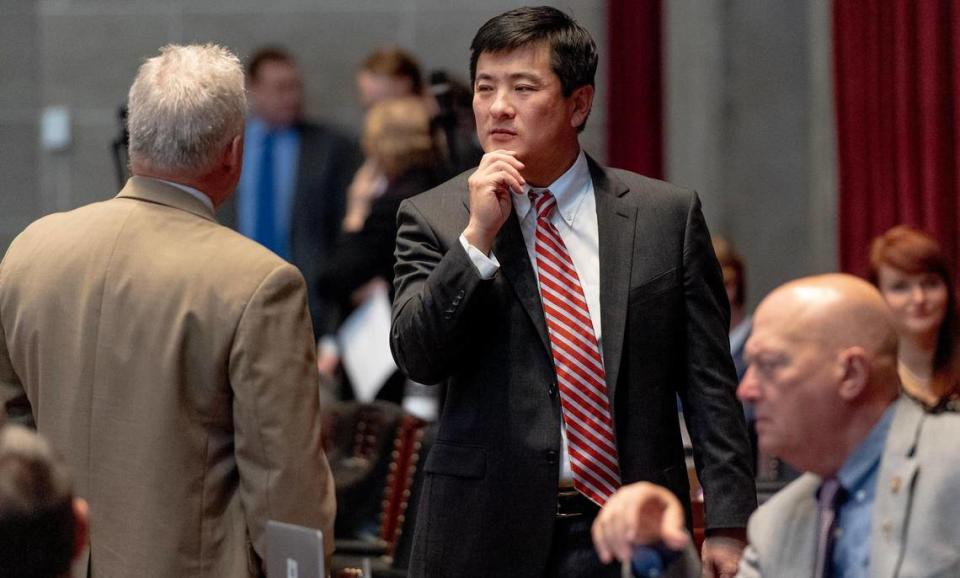Is IVF at risk in Missouri? Experts say abortion rights vote would protect the procedure
A proposed Missouri abortion rights ballot measure would protect access to in vitro fertilization, supporters and experts say, after an Alabama court decision declaring that frozen embryos are children has led to fears the fertility treatment could be in danger.
The ballot measure, a state constitutional amendment championed by the group Missourians for Constitutional Freedom, would enshrine a fundamental right to “reproductive freedom.” Most of the attention on the proposal has centered on how it would overturn Missouri’s near-total abortion ban, but its sweeping language would likely also extend constitutional protections to IVF.
Missouri Republicans, who control the General Assembly and hold every statewide office, have mostly voiced support for IVF, echoing Republicans across the country scrambling to extinguish what some believe could be a political nightmare for the party. Republicans in the Missouri House on Tuesday signaled plans to file a bill that would broadly protect the treatment.
Polling suggests widespread public support for IVF and four out of 10 Americans say they have had some form of fertility treatments or know someone who has undergone them.
But some Missouri Republicans grow ambivalent when asked whether they support freezing embryos, a common part of the procedure, or what should happen to unused embryos. State-level legislation has been introduced for several years that would require judges to consider the “best interests” of embryos in custody disputes.
The Missouri Republican Party platform also says the party supports the “protection of the lives of In Vitro Fertilized embryos and all other human embryos from the beginning of biological development.”
“If it’s a fertilized egg, yes, they are,” Sen. Mike Moon, an Ash Grove Republican, said on Monday when asked if frozen embryos are children.
Moon, one of the General Assembly’s most conservative members, said he is fine with using IVF to help individuals trying to get pregnant but that he doesn’t support freezing embryos, though freezing is central to how the procedure is commonly practiced.
Referring to a state law declaring that life begins at conception, Moon said “there’s this frozen life nonetheless, but, yeah, it’s alive.”
In contrast, U.S. Sen. Josh Hawley said he 100% supports IVF, joining former President Donald Trump and other Republicans across the country in praising the treatment following the Alabama decision. Hawley, who is up for reelection in November, called the procedure “miraculous” for many people and drew a distinction between aborting a viable pregnancy and IVF.
“I’m an evangelical Christian, I don’t have any religious concerns,” Hawley said. “I’m not saying there aren’t moral decisions to be made, but I think those should be made by the couples.”

Status of embryos
During IVF, eggs are fertilized in a lab, creating embryos, which are then placed into a woman’s uterus. The embryos can be placed shortly after they are created or they can be frozen and then thawed for placement months or years later. According to the Cleveland Clinic, frozen embryo transfers are more common and more likely to lead to live births.
IVF is involved in roughly 2% of U.S. births every year. In Missouri, 1,111 babies were born in 2021 using assistive reproductive technology, a category that includes IVF, according to the latest data available from the Centers for Disease Control and Prevention.
The procedure often leaves couples with more embryos than they need. Some thaw and discard them, others donate them for research or to other couples. What those embryos are — and how they should be handled because of that — sits at the core of fears over the future of IVF.
The Alabama Supreme Court earlier this month ruled that frozen embryos can be considered children. The justices ruled that “unborn children are ‘children’ … without exception based on developmental stage, physical location, or any other ancillary characteristics.” Several IVF providers in Alabama have paused operations in the wake of the decision.
President Joe Biden and Democrats nationally have moved swiftly to highlight the ruling, made by an all-Republican court, as evidence of Republicans overstepping on reproductive health care. White House press secretary Karine Jean-Pierre specifically pointed to a Republican-sponsored bill in Congress that guarantees a legal “right to life” at the moment of fertilization, which would apply to embryos created through IVF.
More than 120 Republican lawmakers co-sponsored the bill, including Kansas U.S. Reps. Ron Estes, Tracey Mann and Jake LaTurner, and Missouri U.S. Reps. Blaine Luetkemeyer, Eric Burlison and Sam Graves.
After the U.S. Supreme Court — aided by three Trump-appointed justices — struck down Roe v. Wade in 2022, Democrats successfully used abortion to paint Republicans as too extreme in many races. Voters in Kansas and other Republican-leaning states have also affirmed abortion access in ballot measure contests.
Missourians for Constitutional Freedom in a written statement said the overreach of “extremist politicians in Alabama is exactly what we’re fighting to end here in Missouri.” The group must gather approximately 171,000 signatures by May 5 to place the proposal on the November ballot.
“Whether it’s the cruel abortion ban already on the books in Missouri or the effort to limit access to IVF, what’s clear is that anti-abortion extremists want to take away reproductive freedom from Missourians,” said Tori Schafer, a spokesperson for the group. “Our campaign is about ensuring Missourians are in control of their personal health care decisions, not politicians.”
The amendment says the government “shall not deny or infringe upon a person’s fundamental right to reproductive freedom,” defined as the right to make and carry out decisions on “all matters” related to reproductive health care.
House Minority Leader Crystal Quade, a Springfield Democrat and a candidate for governor, said the Alabama decision “shows us why this ballot initiative is so important — to make sure that we as patients have control over what happens with our reproductive health care.”

While IVF isn’t mentioned explicitly in the amendment, the measure’s language would clearly apply to the procedure, said Michael Wolff, a former Missouri Supreme Court chief justice. “The Alabama decision, I think, was kind of a wake-up call for the need for this kind of protection,” Wolff said.
Sam Lee, a longtime anti-abortion lobbyist in Missouri and president of Missouri Stands with Women, an organization opposing the proposed abortion rights amendment, said he was unsure whether the amendment would impact IVF.
“I’m not really sure as a practical matter it has any effect on it,” he said.
Rep. Bill Allen, a Kansas City Republican, said on Tuesday he was filing a bill that would protect IVF procedures, calling it a “common-sense stance.” A copy of the bill text states that nothing in Missouri law “shall be construed to prohibit any activity associated with vitro fertilization procedures.”
“IVF is an important family tool and we need to make sure that we preserve the rights of, especially couples, that are challenged to have children to use in vitro,” Allen said.
Allen said his legislation doesn’t get into specifics about custody or preservation of embryos. But he said that he doesn’t think frozen embryos are children. “The far right is going to throw out all kinds of ‘what if’ scenarios,” he said. “I mean, let’s just protect IVF.”
‘Moment of conception’
Since the 1980s, a Missouri law — called Chapter 1.205 — has stated that life begins at conception and has defined unborn children to include offspring “from the moment of conception” until birth. Unborn children under the law have “protectable interests in life, health, and well-being,” according to the law.
But the Missouri Court of Appeals Eastern District ruled in a 2016 decision that frozen embryos are not legally children under state law. The case involved a custody dispute over frozen embryos and the court found that applying the law to the embryos would violate the sperm donor’s fundamental rights to privacy, freedom from government interference and right to not procreate.
The frozen embryos are instead “marital property of a special character,” the court ruled. The Missouri Supreme Court declined to hear the case, letting the appeals court decision stand.
One of the decisions cited in the case was Roe v. Wade. Given that Roe has been overturned, Wolff said he’s unsure Missouri courts would reach the same conclusion today.
“I wouldn’t want to rely on that decision to say that things are OK now in terms of IVF,” Wolff said.
Since then, several Republican lawmakers have filed bills that would attempt to overturn the decision by instructing judges in how to consider custody disputes over frozen embryos. At least three such measures have been introduced this session alone.
The measures would direct judges to grant custody to whichever egg or sperm donor intends to develop the embryo to birth. Judges would have to act in the best interest of the embryo. They would also allow years-old custody disputes to be reopened under the new standards.
“I think that these are eggs that were intentionally taken out of her and fertilized and frozen so that she could have children later in life. So why should we not honor that, all of that activity?” said Rep. Renee Reuter, an Imperial Republican who introduced one of the bills on Thursday.
Mary Beck, a professor emerita at the University of Missouri School of Law who has studied law related to assistive reproductive technology, predicted the bills would effectively shutter IVF in the state if they ever became law.
“I think the fundamental problem is the courts getting involved — or the state or the law getting involved — in what is a private decision affecting parentage of two people,” Beck said.
None of the bills have been given a hearing. House Majority Leader Jonathan Patterson, a Lee’s Summit Republican and a physician, said he strongly supports IVF. And when asked about one of the measures, he said he still needs to look at it.
As for what should happen to unused frozen embryos, Patterson said, “I don’t think in Missouri it’s an issue that I’ve seen. So I don’t think we have to do anything.”
“But I just want to stress again that I support IVF and Missouri families’ ability to access it to have kids,” Patterson said.

Democrats say that if Republicans are serious about supporting IVF, they should advance legislation to require health insurance plans in Missouri to cover the treatment. At least 13 states, including Arkansas and Illinois, require IVF coverage, according to RESOLVE: The National Infertility Association.
Rep. Betsy Fogle, a Springfield Democrat, introduced for the second year in a row a bill to require coverage. The legislation hasn’t been referred to a committee, let alone set for a hearing.
Fogle said she offered the bill after meeting with constituents who struggled with getting pregnant but couldn’t afford IVF. The treatment can cost tens of thousands of dollars for couples who go through multiple IVF cycles.
She acknowledged many lawmakers are hesitant to place mandates on insurance coverage, but noted the Legislature has previously required other types of coverage.
“If we as a legislature are going to take such drastic opinions on what a woman and a family can do to plan their family,” Fogle said, “I think it’s important that we put our money where our mouth is.”
The Associated Press contributed reporting

